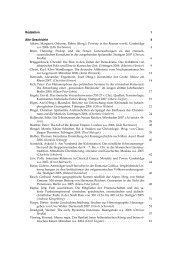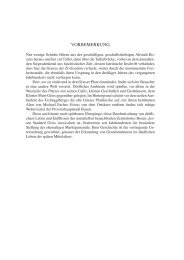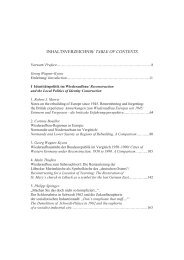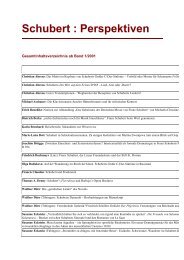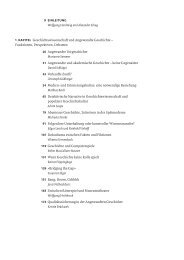Emmanuel Joseph Sieyès, Was ist der Dritte Stand? - Franz Steiner ...
Emmanuel Joseph Sieyès, Was ist der Dritte Stand? - Franz Steiner ...
Emmanuel Joseph Sieyès, Was ist der Dritte Stand? - Franz Steiner ...
Sie wollen auch ein ePaper? Erhöhen Sie die Reichweite Ihrer Titel.
YUMPU macht aus Druck-PDFs automatisch weboptimierte ePaper, die Google liebt.
Rezensionen<br />
norific can only have a meaning if the reason<br />
for it to be bestowed can be contrasted with<br />
situations in which it would be out of place.<br />
The honorific is bestowed on athletes who<br />
show, as I said, extraordinary accomplishments.<br />
They are ‘extra’-‘ordinary’ (beyond<br />
the ordinary) in the sense that ordinary people<br />
(or the athletes with whom they compete)<br />
cannot (or, in any event, do not) perform such<br />
feats.<br />
In the case of ‘human dignity’, the problem<br />
seems to be that everyone who is a<br />
human being is eo ipso qualified a proper<br />
candidate to have dignity bestowed on him.<br />
There is no contrast (not even with those who<br />
lack reason, who are still treated with dignity<br />
(if they cannot fend for themselves, they are<br />
not simply abandoned, which would probably<br />
mean their death, but are taken care of in<br />
special institutions)). There is, of course, the<br />
more fundamental contrast with non-humans<br />
(animals), but that is not relevant here: even<br />
if such a contrast could be defended within<br />
Kateb’s theory (quod non), this would still not<br />
provide sufficient justification to speak of human<br />
dignity (at least not in all cases). If there<br />
is no criterion to bestow an honorific – as dignity<br />
may be said to be –, the honorific itself<br />
loses all meaning.<br />
That this problem ensues can be explained<br />
from the way the author qualifies<br />
‘dignity’, which is not unrelated to the issue<br />
of the inclusion of every human being in the<br />
realm of subjects having dignity, for Kateb<br />
speaks of ‘human dignity’ as an ex<strong>ist</strong>ential<br />
rather than a moral value (pp. 10–17). He demonstrates<br />
his awareness of the difference<br />
with a view such as Kant’s, who does connect<br />
dignity with morality (p. 13). (Incidentally,<br />
Kant speaks not about human dignity per se,<br />
arguing that any rational being may have dignity.)<br />
Kant’s approach faces some – or, rather,<br />
many – difficulties of its own, but he is in<br />
any case clear about the criteria for dignity<br />
to be bestowed on a being. Such an option<br />
seems ruled out in Kateb’s line of thought, ins<strong>ist</strong>ing<br />
that “Human dignity is an ex<strong>ist</strong>ential<br />
value; value or worthiness is imputed to the<br />
identity of the person or the species.” (p. 10).<br />
On p. 24, Kateb says of human stature: “Human<br />
stature is essentially an ex<strong>ist</strong>ential, not a<br />
moral, value.”<br />
An alternative would be, then, not to focus<br />
on the ‘human’ part of ‘human dignity’<br />
129<br />
but rather to deem a character<strong>ist</strong>ic decisive<br />
which some may be said to exhibit and which<br />
others lack, such as rationality. Such an alternative<br />
brings its own complications with it, but<br />
these need not be discussed here as Kateb<br />
does not opt for it (indeed, as I indicated, the<br />
problem is rather that he does not choose at<br />
all). I mention it merely to remark that an alternative<br />
to Kateb’s theory, which would, of<br />
course, have to be examined just as critically,<br />
is not readily available, at least not as long as<br />
one aspires to present a theory that is just as<br />
elevated. Perhaps one may even reach the<br />
conclusion that such a project must be given<br />
up.<br />
In any event, Kateb’s ambition seems to<br />
exceed what he can demonstrate, and the<br />
extent to which a theory must be justified corresponds<br />
with that of its claims rather than<br />
with its (intuitive) appeal or the aspirations of<br />
its originator. That is not to say that the book<br />
is without merit, but such merit lies primarily<br />
in indicating what is at stake in the human<br />
dignity debate, and in which setting such a<br />
debate can take place.<br />
Jasper Doomen<br />
J.D., J. Perkstraat 4 A, 2321 VH Leiden, The<br />
Netherlands, jasperdoomen@yahoo.com<br />
ARSP (Archiv für Rechts- und Sozialphilosophie), Band 99/1 (2013)<br />
© <strong>Franz</strong> <strong>Steiner</strong> Verlag, Stuttgart<br />
Urheberrechtlich geschütztes Material. Jede Verwertung außerhalb <strong>der</strong> engen Grenzen des Urheberrechtsgesetzes <strong>ist</strong> unzulässig und strafbar.<br />
Das gilt insbeson<strong>der</strong>e für Vervielfältigungen, Übersetzungen, Mikroverfilmungen und die Einspeicherung und Verarbeitungen in elektronischen Systemen.<br />
© <strong>Franz</strong> <strong>Steiner</strong> Verlag, Stuttgart 2013



